Recording of the Indigenous Women in STEM panel discussion from the Finding Ada Conference 2020.
Synopsis
Our panellists will be talking about their experiences as indigenous women, how they got into STEM, the issues specific to their indigenous communities when it comes to encouraging girls into STEM, the role of organisations and institutions in supporting indigenous women in STEM and more.
Featuring:
- Karlie Noon, astrophysicist
- Aleisha Amohia, software developer
- Johnnie Jae, journalist & technologist
- Shawn Peterson of Native Girls Code
- Eteroa Lafaele, software engineer
Our speakers
Karlie Noon
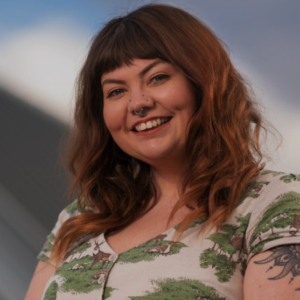 Karlie Alinta Noon is a Gamilaray astrophysicist who is passionate about Indigenous astronomical knowledge and communicating science. She was the first Indigenous female to obtain degrees in physics and mathematics, completed at the University of Newcastle in 2016. She has since completed a master’s degree in astrophysics at the Australian National University in 2019 and became the Sydney Observatory’s first Astronomy Ambassador in 2020. Karlie has also been an Indigenous Heritage Officer at the Department of Agriculture, Water, and the Environment since 2018, helping place Indigenous heritage sites on the National Heritage List. Karlie was an ACT Young Australian of the Year 2019 finalist and a Eureka Prize Emerging Leader 2019 finalist.
Karlie Alinta Noon is a Gamilaray astrophysicist who is passionate about Indigenous astronomical knowledge and communicating science. She was the first Indigenous female to obtain degrees in physics and mathematics, completed at the University of Newcastle in 2016. She has since completed a master’s degree in astrophysics at the Australian National University in 2019 and became the Sydney Observatory’s first Astronomy Ambassador in 2020. Karlie has also been an Indigenous Heritage Officer at the Department of Agriculture, Water, and the Environment since 2018, helping place Indigenous heritage sites on the National Heritage List. Karlie was an ACT Young Australian of the Year 2019 finalist and a Eureka Prize Emerging Leader 2019 finalist.
Twitter: @karlie_moon_
Facebook: /karlienoon
Instagram: /karlienoon
Website: karlienoon.squarespace.com
Aleisha Amohia
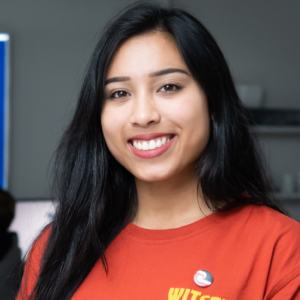 Aleisha Amohia (Te Ātihaunui-a-Papārangi) (she/her) is a passionate young advocate for diversity and inclusion in all spaces, but especially the technology industry. Born and raised in Te Whanganui-a-Tara, Aleisha gets her energy from her supportive whānau and friends, and is driven by the idea of a future where STEM industries care less about innovation for profit, and more about ethical innovation for people and planet.
Aleisha Amohia (Te Ātihaunui-a-Papārangi) (she/her) is a passionate young advocate for diversity and inclusion in all spaces, but especially the technology industry. Born and raised in Te Whanganui-a-Tara, Aleisha gets her energy from her supportive whānau and friends, and is driven by the idea of a future where STEM industries care less about innovation for profit, and more about ethical innovation for people and planet.
Aleisha recently graduated from Victoria University of Wellington with a Bachelor of Science (Computer Science and Artificial Intelligence) and a Bachelor of Commerce (Management and Information Systems), and now works full-time as a software developer for global open source project Koha, at Catalyst IT. In her spare time, Aleisha is also the Wellington Branch Vice President for the National Council of Women New Zealand, where she is able to contribute her skills and years of experience to causes that affect and involve all wāhine.
Twitter: @aleishaamohia
LinkedIn: /aleishaamohia
Eteroa Lafaele
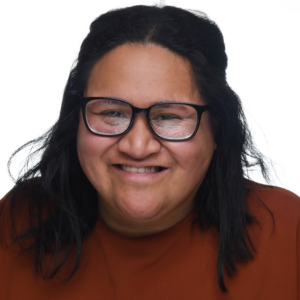 Eteroa Lafaele is a proud Samoan woman born and bred in Cannons Creek, Porirua. She is a STEM ambassador for Maori and Pasifika people in tech.
Eteroa Lafaele is a proud Samoan woman born and bred in Cannons Creek, Porirua. She is a STEM ambassador for Maori and Pasifika people in tech.
She is currently a developer and Community Manager for Voluntarily. And she hopes to take this experience and use it to help her community and family!
LinkedIn: /eteroa
Johnnie Jae
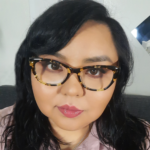 Johnnie Jae is an Otoe-Missouria and Choctaw rabble-rousing journalist, organizer, creator, and futurist who loves empowering others to chase their passions and create for healing and revolutionary change in the world. She is the founder of A Tribe Called Geek, an award-winning media platform for Indigenous Geek Culture and STEM, and #Indigenerds4Hope, a suicide prevention initiative designed to educate, encourage, and empower Native youth. Jae is a co-founder of Not Your Mascots and LiveIndigenousOK. She is a member of the Women Warriors Work Collective and served as a co-chair for the 2017 March for Racial Justice. She was the host of the Indigenous Flame and A Tribe Called Geek podcasts and worked as a producer for several other podcasts on the Success Native Style Radio Network.
Johnnie Jae is an Otoe-Missouria and Choctaw rabble-rousing journalist, organizer, creator, and futurist who loves empowering others to chase their passions and create for healing and revolutionary change in the world. She is the founder of A Tribe Called Geek, an award-winning media platform for Indigenous Geek Culture and STEM, and #Indigenerds4Hope, a suicide prevention initiative designed to educate, encourage, and empower Native youth. Jae is a co-founder of Not Your Mascots and LiveIndigenousOK. She is a member of the Women Warriors Work Collective and served as a co-chair for the 2017 March for Racial Justice. She was the host of the Indigenous Flame and A Tribe Called Geek podcasts and worked as a producer for several other podcasts on the Success Native Style Radio Network.
Twitter: @johnniejae
Facebook: /officialjohnniejae
Instagram: /johnniejae
Website: johnniejae.com
Shawn Peterson
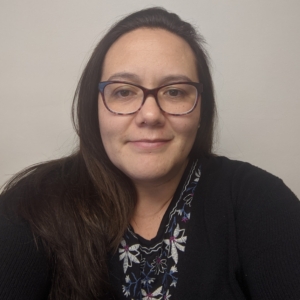 Shawn Peterson is a Nuu-chah-nulth and Youth Program Manager, and is passionate about working with the Native community and youth to ensure they have the tools and resources to positively impact their lives. Her work is grounded in youth learning new skills, strengthening their identity, connection with peers, and mentors— all of which contribute to their success. She has 5+ years of experience in youth program development and implementation. This includes Native Girls Code, a program focused on computer coding and culturally relevant STEM content for Native Girls ages 12-18. Shawn works tirelessly to promote inclusive spaces for Indigenous people with accurate and positive representation. She was raised in Kirkland Washington, and currently lives in Seattle with her two young children. She graduated from the University of Washington Bothell with a Bachelor’s degree in Community Psychology and a Human Rights minor. While studying there, she launched RAIN (Reaching American Indian Nations), a yearly outreach event for Native students to explore college.
Shawn Peterson is a Nuu-chah-nulth and Youth Program Manager, and is passionate about working with the Native community and youth to ensure they have the tools and resources to positively impact their lives. Her work is grounded in youth learning new skills, strengthening their identity, connection with peers, and mentors— all of which contribute to their success. She has 5+ years of experience in youth program development and implementation. This includes Native Girls Code, a program focused on computer coding and culturally relevant STEM content for Native Girls ages 12-18. Shawn works tirelessly to promote inclusive spaces for Indigenous people with accurate and positive representation. She was raised in Kirkland Washington, and currently lives in Seattle with her two young children. She graduated from the University of Washington Bothell with a Bachelor’s degree in Community Psychology and a Human Rights minor. While studying there, she launched RAIN (Reaching American Indian Nations), a yearly outreach event for Native students to explore college.
Twitter: @naahillaheefund
Facebook: /naahillaheefund
Instagram: /naahillaheefund
Website: naahillahee.org
 Karlie Alinta Noon is a Gamilaray astrophysicist who is passionate about Indigenous astronomical knowledge and communicating science. She was the first Indigenous female to obtain degrees in physics and mathematics, completed at the University of Newcastle in 2016. She has since completed a master’s degree in astrophysics at the Australian National University in 2019 and became the Sydney Observatory’s first Astronomy Ambassador in 2020. Karlie has also been an Indigenous Heritage Officer at the Department of Agriculture, Water, and the Environment since 2018, helping place Indigenous heritage sites on the National Heritage List. Karlie was an ACT Young Australian of the Year 2019 finalist and a Eureka Prize Emerging Leader 2019 finalist.
Karlie Alinta Noon is a Gamilaray astrophysicist who is passionate about Indigenous astronomical knowledge and communicating science. She was the first Indigenous female to obtain degrees in physics and mathematics, completed at the University of Newcastle in 2016. She has since completed a master’s degree in astrophysics at the Australian National University in 2019 and became the Sydney Observatory’s first Astronomy Ambassador in 2020. Karlie has also been an Indigenous Heritage Officer at the Department of Agriculture, Water, and the Environment since 2018, helping place Indigenous heritage sites on the National Heritage List. Karlie was an ACT Young Australian of the Year 2019 finalist and a Eureka Prize Emerging Leader 2019 finalist. Aleisha Amohia (Te Ātihaunui-a-Papārangi) (she/her) is a passionate young advocate for diversity and inclusion in all spaces, but especially the technology industry. Born and raised in Te Whanganui-a-Tara, Aleisha gets her energy from her supportive whānau and friends, and is driven by the idea of a future where STEM industries care less about innovation for profit, and more about ethical innovation for people and planet.
Aleisha Amohia (Te Ātihaunui-a-Papārangi) (she/her) is a passionate young advocate for diversity and inclusion in all spaces, but especially the technology industry. Born and raised in Te Whanganui-a-Tara, Aleisha gets her energy from her supportive whānau and friends, and is driven by the idea of a future where STEM industries care less about innovation for profit, and more about ethical innovation for people and planet. Eteroa Lafaele is a proud Samoan woman born and bred in Cannons Creek, Porirua. She is a STEM ambassador for Maori and Pasifika people in tech.
Eteroa Lafaele is a proud Samoan woman born and bred in Cannons Creek, Porirua. She is a STEM ambassador for Maori and Pasifika people in tech.
